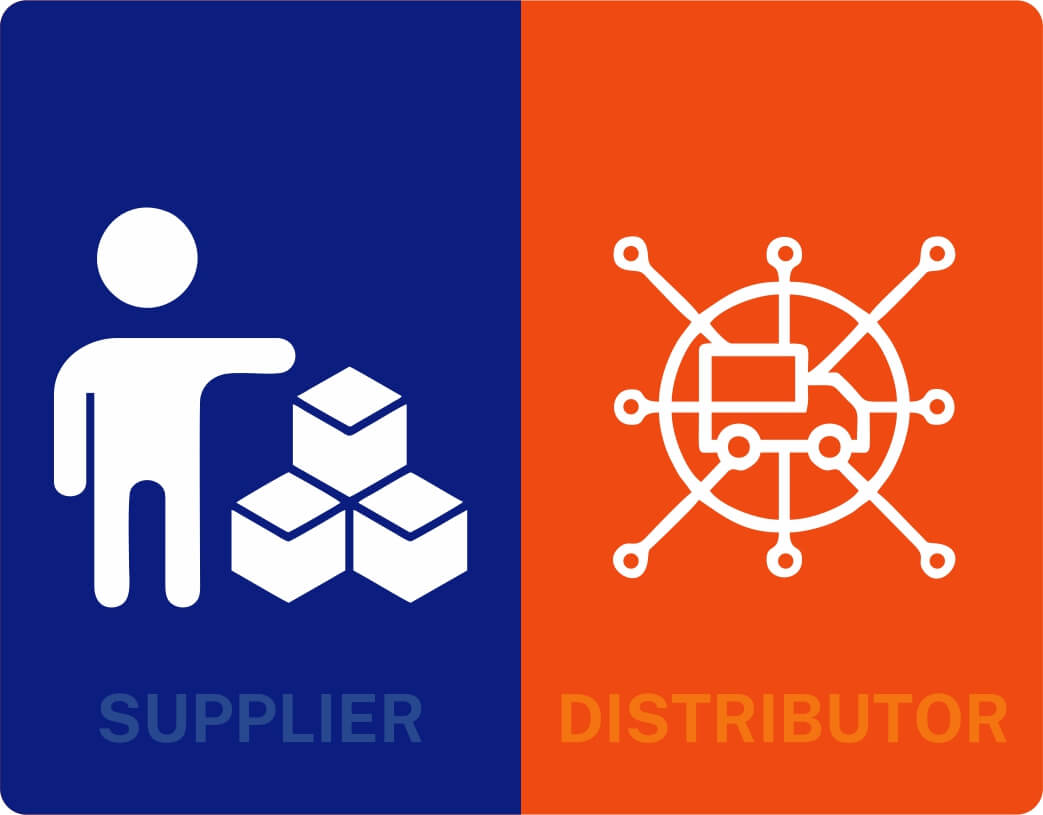- GF/ SF - Tejas, Opp Hotel Prasadalay, Shukrawar Peth, Pune - 411002
- +91 90 2132 2132
Understanding Key Differences Between Supplier and Distributor

In the world of business, we often hear the terms "supplier" and "distributor, but they’re not quite the same thing. While both suppliers and distributors play significant roles in delivering products from manufacturers to consumers, they serve different functions. Understanding these differences enables a business to refine its operations and make better decisions.
So, even if you are in the supply chain for the first time and want some extra clarity on what the difference is between suppliers and distributors, let us dissect exactly what the unique aspects are of suppliers and distributors as well as why it all matters for your business.
So, What Exactly Is a Supplier?
A supplier refers to an entity, either a company or an individual, that provides goods and services to a business for use in the manufacture of other products or services. Suppliers are the core element of the supply chain as they provide the raw material, components, or finished goods required by the business in the manufacture or operations.
Suppliers can operate at various stages of the production process. Whereas some raw materials (such as metals, textiles, or chemicals), others are in the trade of finished goods ready for resale. The relationship between suppliers and some businesses is generally for long-term contracts and includes the supplier's responsibilities in terms of product quality, quantity, and timely delivery.
The role of suppliers is critical in keeping the supply chain moving. The effectiveness and reliability with which suppliers do their duties directly reflect an industry's ability to manufacture goods, meet demand, and satisfy customer needs. Therefore, selecting the right supplier is crucial for your business to operate smoothly and stay competitive in the market.
Now, Let’s Talk About Distributors
The distributor, therefore, is an intermediary between you and things that you want to buy or buy from the shops or people who need them. Taking goods from manufacturers or suppliers, storing products in warehouses, and selling them to distributors, retailers, or even the end consumers. In summary, distributors help to carry goods from the production line to the marketplace.
They tend to purchase in bulk, warehouse the products, and break the inventory into smaller lots for efficient distribution. But their job doesn’t end there, they handle logistics and shipping and even marketing from time to time, ensuring that products reach the right people at the right time. For businesses, having a distributor is a great way to expand without getting bogged down in the details of retail or consumer sales.
Take logistics, for example: In such cases, it is the distributors who manage the movement of goods with respect to their timely delivery and storage. While suppliers are in charge of creating the products, logistics are handled by the distributors to ensure that they are sent to the right place at the right time.
Putting It All Together: Suppliers vs. Distributors
A brief comparison between the suppliers and the distributors is given in the table below:
| Supplier | Distributor |
|---|---|
| Provides raw materials or finished goods to businesses | Buys products and sells them to retailers or consumers |
| Focuses on production and delivery of goods or materials | Focuses on logistics, inventory, and product distribution |
| Works directly with manufacturers to supply goods | Works with multiple suppliers or manufacturers, reselling products |
| May serve local or global markets | Typically has a broader geographic reach, expanding market access |
| Product creation or sourcing | Product movement, sales, and customer access |
How Understanding This Difference Can Benefit Your Business
Understanding the difference between suppliers and distributors is far more important than it seems, especially in running a smooth business. The right information regarding who does what in the supply chain allows you to make smarter decisions to save time, money, and energy.
To give an example, the suppliers provide the raw materials or the products, and the distributors are responsible for distributing these products in the market. When one intends to know when to work directly with a supplier or rely on a distributor, it can help in making supply chain operations much more efficient. It allows you to focus on what you do best - whether it’s making great products or selling them.
Powerful connections with suppliers and distributors can really give your business an edge. You will be in a position to reach maximum customers, minimize costs, and run operations effectively. Most times, competition will be among businesses that can take advantage of both supplier and distributor relationships.
Bottom Line
Essentially, every business intent on improving its supply chain needs to realize the difference between suppliers and distributors. Suppliers are the ones who provide raw materials or finished goods for production; distributors oversee their logistics and ensure that products reach the market. By appreciating the moments when negotiations must be made with one of them, businesses could create more streamlined operations with efficient decisions.
Good relationships with suppliers and distributors could build profit margins, wider market reach, and growth. Therefore, suppliers and distributors should be open to any business that sees them as vital factors in the continuing competitive whole market.
